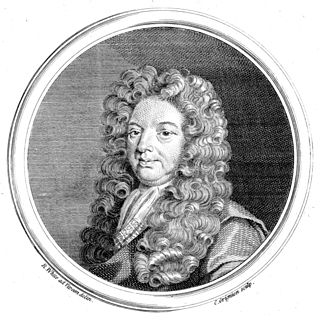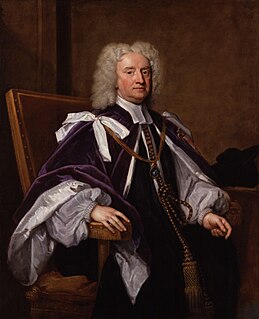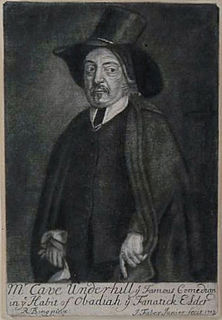Related Research Articles

Henry Purcell was an English composer. Although he incorporated Italian and French stylistic elements, Purcell's was a uniquely English form of Baroque music. He is generally considered to be one of the greatest English composers; no later native-born English composer approached his fame until Edward Elgar, Ralph Vaughan Williams, Gustav Holst, William Walton and Benjamin Britten in the 20th century.

John Blow was an English Baroque composer and organist, appointed organist of Westminster Abbey in late 1668. His pupils included William Croft, Jeremiah Clarke and Henry Purcell. In 1685 he was named a private musician to James II. His only stage composition, Venus and Adonis, is thought to have influenced Henry Purcell's later opera Dido and Aeneas. In 1687 he became choirmaster at St Paul's Cathedral, where many of his pieces were performed. In 1699 he was appointed to the newly created post of Composer to the Chapel Royal.
John Eccles was an English composer.

John Playford (1623–1686/7) was a London bookseller, publisher, minor composer, and member of the Stationers' Company, who published books on music theory, instruction books for several instruments, and psalters with tunes for singing in churches. He is perhaps best known today for his publication of The English Dancing Master in 1651.

Giovanni Bononcini was an Italian Baroque composer, cellist, singer and teacher, one of a family of string players and composers.
The Bach family was of importance in the history of music for nearly two hundred years, with over 50 known musicians and several notable composers, the best-known of whom was Johann Sebastian Bach (1685–1750). A family genealogy was drawn up by Johann Sebastian Bach himself in 1735, his 50th year, and completed by his son Carl Philipp Emanuel.
Thomas D'Urfey was an English writer and wit. He composed plays, songs, and poetry, in addition to writing jokes. He was an important innovator and contributor in the evolution of the Ballad opera.

Sir Jonathan Trelawny, 3rd Baronet was a British Bishop of Bristol, Bishop of Exeter and Bishop of Winchester. Trelawny is best known for his role in the events leading up to the Glorious Revolution which are sometimes believed to be referenced in the Cornish anthem The Song of the Western Men.
Johann Paul von Westhoff was a German Baroque composer and violinist. One of the most important exponents of the Dresden violin school, he was among the highest ranked violinists of his day, and composed some of the earliest known music for solo violin. He worked as musician and composer as a member of Dresden's Hofkapelle (1674–1697) and at the Weimar court (1699–1705), and was also active as a teacher of contemporary languages.
Tokugawa Tsunanari was daimyō of Owari Domain during early-Edo period Japan.
Giovanni Battista Bassani was an Italian composer, violinist, and organist.
Johannes Schenck was a Dutch musician and composer.
John Lenton was an English composer, violinist, and singer.

Clamor Heinrich Abel was a German composer, violinist and organist.
William Turner was a composer and countertenor of the Baroque era. A contemporary of John Blow and Henry Purcell, he is best remembered for his verse anthems, of which over forty survive. As a singer, he was a Gentleman of the Chapel Royal from 1669 until his death.

Cave Underhill (1634–1710?) was an English actor in comedy roles.
Johann Sigismund Kusser or Cousser was a composer born in the Kingdom of Hungary who was active in Germany, France, and Ireland.
Thomas Farmer was an English composer.
Joseph Williams was an English stage actor of the seventeenth and early eighteenth century.
References
- This article incorporates text from a publication now in the public domain : Grove, George, ed. (1900). . A Dictionary of Music and Musicians . London: Macmillan and Company.